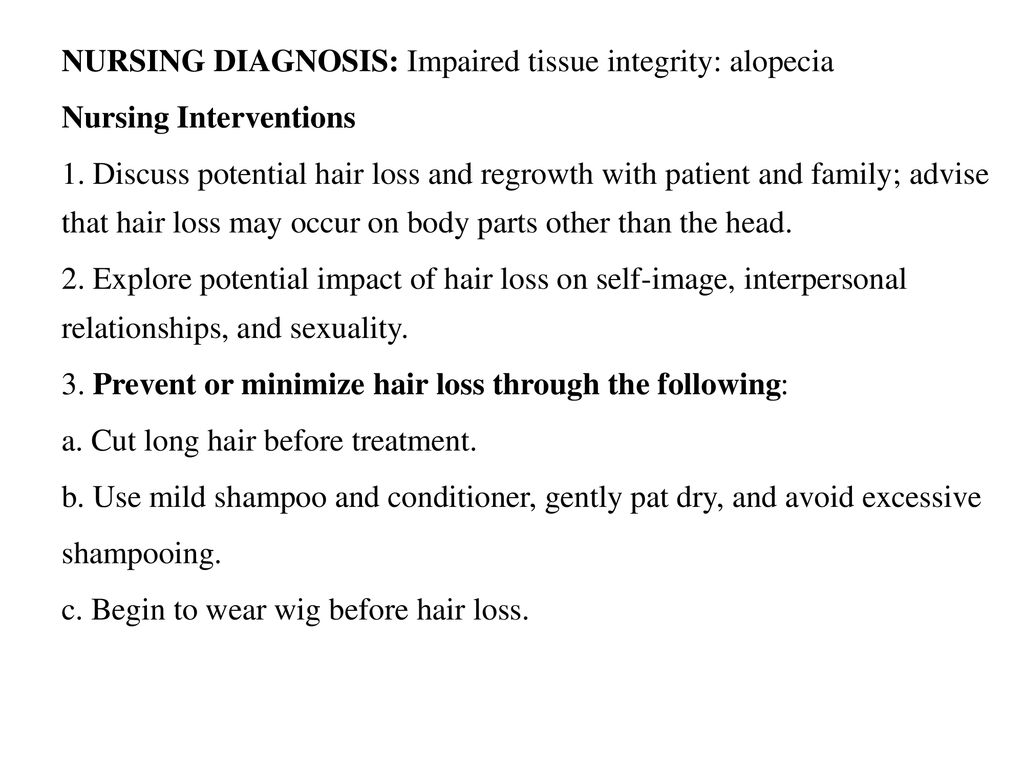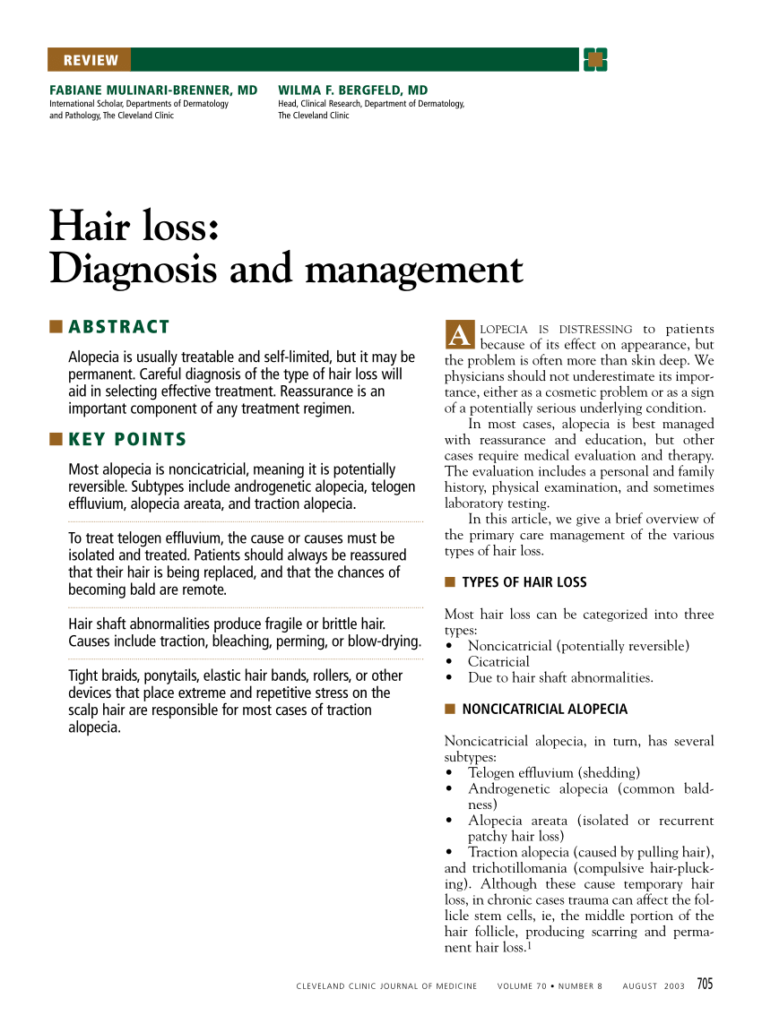Are you a nurse who often deals with patients experiencing hair loss? If so, it’s important to understand the nursing considerations and management approaches for this common issue. From helping patients cope emotionally to providing guidance on maintenance and styling options, nurses play a crucial role in supporting individuals who are dealing with balding. In this article, we will explore the various nursing considerations and management strategies to effectively care for patients experiencing hair loss.
Nursing Considerations for Hair Loss
Hair loss can be a distressing experience for individuals, affecting their self-esteem and overall well-being. As a nurse, it is essential to understand the causes of hair loss and effectively assess and support patients experiencing this condition. By promoting self-esteem and body image, providing emotional support, educating patients on hair care and scalp health, collaborating with other healthcare providers, facilitating referrals to specialists, assisting with wigs and hairpieces, managing scalp irritation and sensitivity, and monitoring and managing side effects of medications, nurses can play a vital role in helping patients through their hair loss journey.
Understanding the Causes of Hair Loss
When encountering patients with hair loss, it is crucial to have a comprehensive understanding of the various causes that may contribute to this condition. Hair loss can result from factors such as genetics, hormonal changes, underlying medical conditions, stress, nutritional deficiencies, chemotherapy, and certain medications. By identifying the underlying cause, nurses can provide appropriate care and support tailored to the individual needs of the patient.
Assessing the Patient’s Hair Loss
Assessing the extent and characteristics of hair loss is an essential step in providing appropriate care. Nurses should conduct thorough assessments by examining the patient’s scalp, documenting the pattern and severity of hair loss, and assessing any associated symptoms such as itching or pain. This assessment will help determine the appropriate interventions and allow for accurate monitoring of the patient’s progress over time.

Promoting Self-esteem and Body Image
Hair loss can significantly impact an individual’s self-esteem and body image. As a nurse, it is crucial to provide support and reassurance to patients experiencing these emotional challenges. By actively listening, providing empathy, and validating their emotions, you can create a safe space for patients to express their concerns and fears. Encouraging patients to explore alternative ways to enhance their appearance, such as stylish headscarves or creative hairstyles, can also boost their self-confidence and body image.
Providing Emotional Support
Dealing with hair loss can be emotionally challenging for patients, leading to feelings of sadness, anxiety, or even depression. As a nurse, you can play a vital role in providing emotional support to help patients cope with these feelings. Active listening, empathetic communication, and being a source of encouragement and motivation can go a long way in helping patients navigate their emotions and adjust to their changing appearance.
Educating Patients on Hair Care and Scalp Health
Proper hair care and scalp health are crucial for individuals experiencing hair loss. Nurses can educate patients on maintaining a healthy scalp, including gentle cleansing techniques, proper moisturization, and using products specifically designed for sensitive scalps. Additionally, providing information about dietary considerations and the importance of a well-balanced diet rich in vitamins and minerals can have a positive impact on hair health.
Collaborating with Other Healthcare Providers
Hair loss can often be a multifaceted issue requiring collaboration with other healthcare providers. By establishing effective communication and collaboration with dermatologists, endocrinologists, oncologists, or other specialists, nurses can ensure comprehensive care for patients. This collaborative approach can help identify underlying medical conditions, adjust medications, or explore additional treatment options to address the root cause of the hair loss.

Facilitating Referrals to Specialists
In some cases, patients experiencing hair loss may benefit from the expertise of specialists who focus specifically on hair disorders. Nurses can play a crucial role in facilitating referrals to these specialists, ensuring that patients receive the specialized care they need. By providing patients with information about available resources and coordinating appointments, nurses can support patients throughout their journey to seek further evaluation and treatment options.
Assisting with Wigs and Hairpieces
For patients who struggle with the emotional impact of hair loss, wigs and hairpieces can be a valuable solution. As a nurse, you can assist patients in exploring different options, providing information about reputable resources, and offering guidance on style customization and proper maintenance. By helping patients find a wig or hairpiece that suits their needs and preferences, you can contribute to their overall well-being and self-confidence.

Managing Scalp Irritation and Sensitivity
Hair loss can sometimes be accompanied by scalp irritation and sensitivity, potentially causing discomfort for patients. Nurses can play a role in managing these symptoms by recommending gentle and hypoallergenic hair and scalp care products. Providing information on soothing techniques, such as cool compresses or scalp massages, can also alleviate discomfort and promote scalp health.
Monitoring and Managing Side Effects of Medications
Some medications aimed at treating other health conditions can have the side effect of hair loss. As a nurse, it is crucial to be aware of these potential side effects and regularly monitor patients who may be at risk. By closely monitoring the patient’s response to medications and promptly addressing any concerns or adverse effects, nurses can ensure that appropriate actions are taken. This may involve adjusting medication dosages, exploring alternative treatment options, or collaborating with healthcare providers to find the most suitable solution for the patient.
In conclusion, hair loss can significantly impact an individual’s self-esteem and overall well-being. As nurses, it is essential to provide holistic care by understanding the causes of hair loss, assessing patients thoroughly, promoting self-esteem and body image, providing emotional support, educating patients on hair care and scalp health, collaborating with other healthcare providers, facilitating referrals to specialists, assisting with wigs and hairpieces, managing scalp irritation and sensitivity, and monitoring and managing side effects of medications. By implementing these nursing considerations, nurses can make a meaningful difference in helping patients navigate their hair loss journey with confidence and support.

